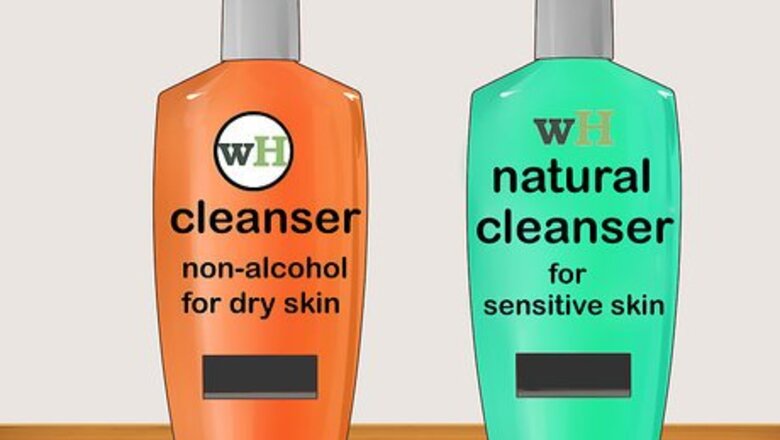
views
Using Acne-Fighting Products
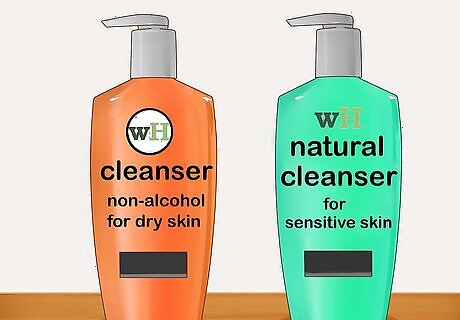
Buy a cleanser for your skin type. Skin may be oily, dry, or combination, and each type has a different cleansing need. You may also have sensitive skin that reacts negatively to harsh chemicals. Most face washes are created for a specific type of skin. In some cases, your acne may clear up within a week! For example, if you have dry skin, you should avoid face washes containing alcohol. If you have sensitive skin, you want to try natural cleansers or ones formulated for sensitive skin. If you don't have sensitive skin, you might try using a cleanser that contains an active ingredient such as salicylic acid or benzoyl peroxide.
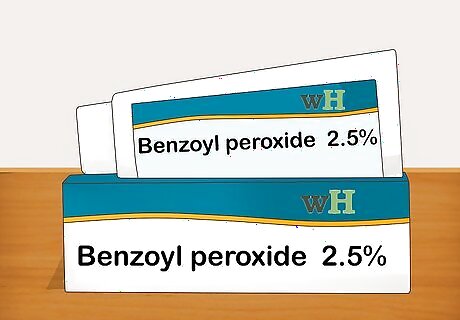
Try a benzoyl peroxide product. Benzoyl peroxide kills bacteria that causes acne, reduces the size of pimples, and opens up your pores. You can buy spot treatment products that you can apply directly onto the pimples and acne. These products come in gels and creams. When you use these products, you may start to see improvement by the next day. Most benzoyl peroxide products you can buy in the store contain up to a 2.5% concentration, although you may find up to 10%. A dermatologist can prescribe a stronger benzoyl peroxide treatment. They may even recommend one that is combined with other forms of acne treatment.
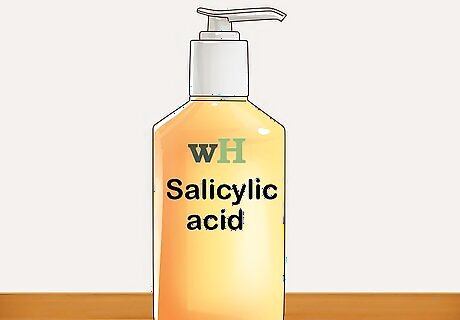
Use a salicylic acid product. Salicylic acid is the other most common acne fighting ingredient found in products. It helps reduce redness, inflammation, and oil while giving your skin a smoother texture. You can buy products that contain salicylic acid in gel form or an acne treatment kit. When you use products with this ingredient, you may start to see improvement by the next day. Look for a product that contains between 1% and 3% salicylic acid.
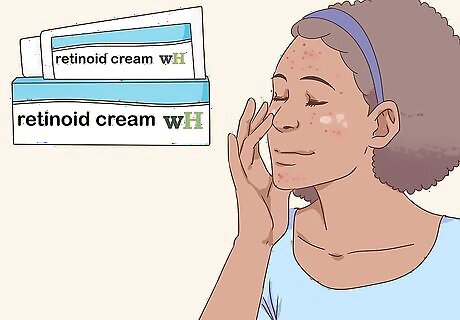
Apply a retinoid cream to your acne. Retinoid creams contain high levels of vitamin A. They can reduce inflammation, open pores, and treat acne scars. Most retinoid creams require a prescription, although there is one, Differin, that you can buy over the counter. Your skin should be completely dry when you use a retinoid cream. Try applying it thirty minutes after washing your face. When you first start applying retinoid creams, use it every other night. After a few weeks, you can use it every day. Retinoid creams can make your skin sensitive to the sun. Always wear sunscreen while using this product.
Using Natural Treatments
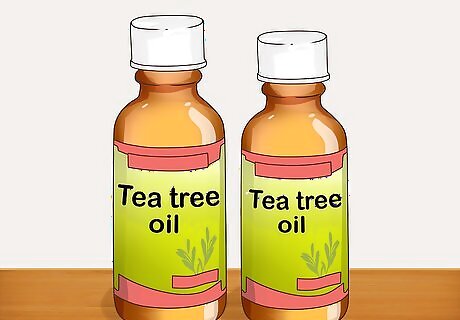
Use tea tree oil. Tea tree oil has been used to reduce skin irritation and acne for years. Apply a small amount of tea tree oil directly to your acne. Do this after washing your face for the best results. You can also combine tea tree with a small amount of coconut oil. Coconut oil may also help fight acne fast. You may need a carrier oil, such as olive oil or castor oil, to prevent irritation. Tea tree oil may irritate or burn your skin. If you feel any discomfort, stop using it and talk to your doctor.
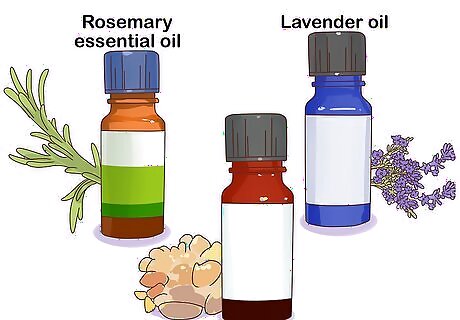
Try essential oils. In addition to tea tree oil, other essential oils have been used in natural acne remedies. Mix a few drops of the essential oil with a carrier oil like olive oil or jojoba oil before placing it on your skin. Try dabbing any of the following oils on your acne: Rosemary essential oil Lavender oil Frankincense oil Apricot seed oil Hemp seed oil
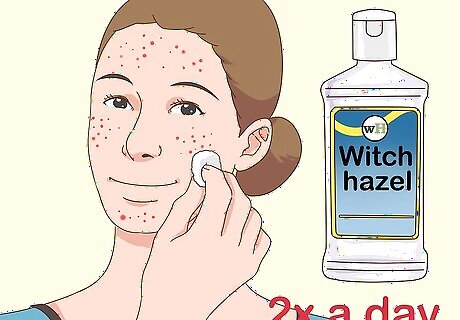
Put on some witch hazel. Witch hazel is a natural astringent that has antibacterial and anti-inflammatory properties. Pour witch hazel onto a cotton ball and wipe it over your acne twice each day.
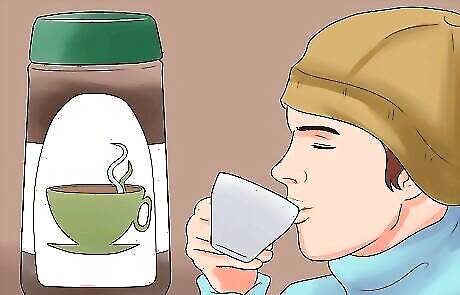
Dab on apple cider vinegar. You can use it to help shrink your pimples. Apply it to your entire face as a toner or dab it more heavily on your pimples specifically. If you have sensitive skin or you feel a burning sensation, dilute it with water.
Using Face Masks
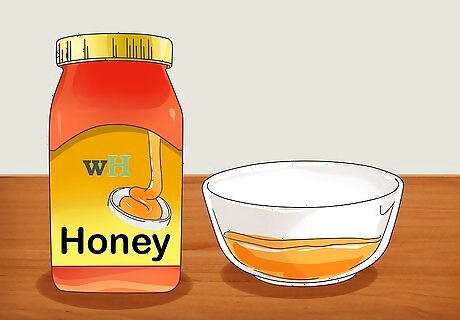
Make a honey mask. Honey may help to clear clogged pores and lift off excess oil and dead skin. Coat your whole face in honey and leave it for as long as you can before rinsing off. Additionally, dab honey directly on your pimples and cover with a bandage while you sleep overnight. Use warm water to remove honey. If any sticks, use your face cleanser to remove it.
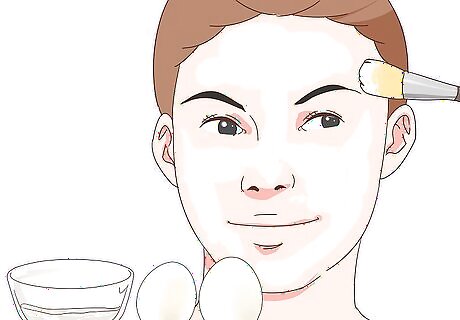
Put on an egg white mask. Egg whites help reduce redness and tighten the skin, which can help reduce pimples. Separate the egg whites from the yolks, and then beat them until they are foamy. Spread the egg whites over the acne. Leave on for 15 minutes, and then rinse off the mask with warm water. You can also add some fresh lemon juice to the egg white mask. Be aware that egg whites are uncooked food so there is a risk of foodborne illness. Make sure not to get it in your mouth.
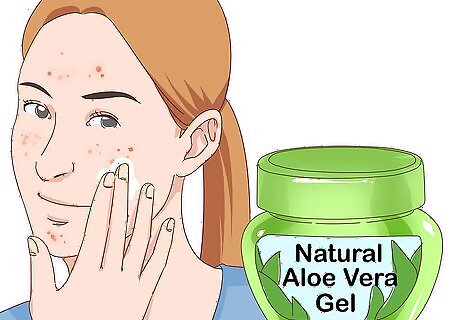
Apply aloe vera. Aloe reduces inflammation, helps remove oil, and cools your skin. This can help alleviate some of your acne. Get an aloe leaf and cut off a small section. Dig out the inside of the leaf. Crush it until it is a smooth paste. Spread the aloe gel paste onto your acne. If you are buying aloe vera gel, only use the natural, pure kind. This can be found at natural stores. The stuff you buy in superstores shouldn't be used on your face.
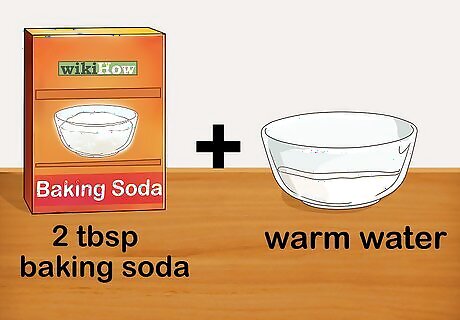
Make a baking soda paste. Baking soda can help reduce inflammation and loosen oil and dirt that causes pimples. To make a baking soda paste, take around two tablespoons (30 g) of baking soda and add warm water to it. Add just enough water so that the baking soda becomes a firm paste. Apply to a wet face and leave on for 15 to 30 minutes. Rinse away with warm water. The paste should be thick enough to stick on your face and not drip off.
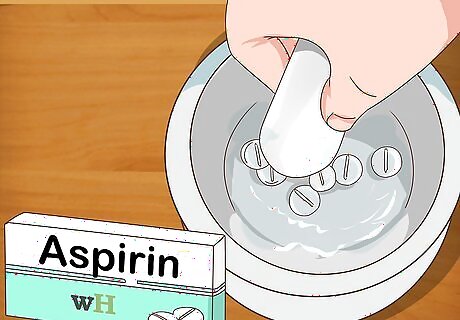
Make an aspirin mask. There is non-conclusive evidence that placing an aspirin mask t on your face can help heal your pimple. Mix one part aspirin to three parts water. The aspirin will dissolve in the water, so you don't have to crush it. After it thickens, apply it over the acne. Leave on for at least 30 minutes, or until it begins to harden. Remove with a wet cloth. Don't use an aspirin mask if you are allergic to aspirin, have Reye's syndrome, drink high amounts of alcohol, are pregnant or breast-feeding, or take medications that don't mix with aspirin.
Trying Other Options
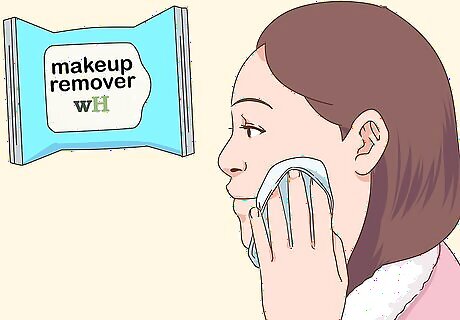
Remove your makeup before exercising or going to bed. Old makeup can encourage the growth of bacteria and clog your skin. Before you sweat or sleep, take off your makeup. To make sure that it is completely removed, use a makeup remover, oil cleanser, or micellar water before cleansing your face.
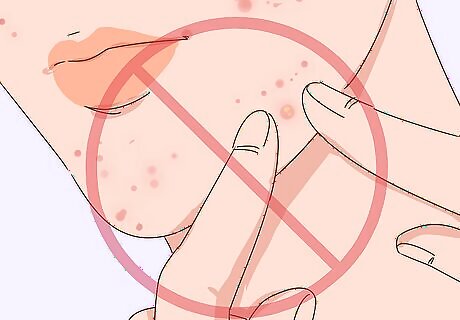
Avoid popping pimples. Though you may want to pop the acne on your face, you should resist the temptation. Popping pimples can lead to worse redness and swelling of the area, and it can push bacteria and pus deeper into your pores, making the pimple hang around longer. Popping zits can also lead to scarring.
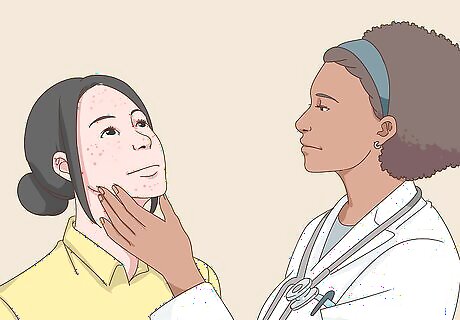
See a dermatologist if your acne does not improve. If your acne doesn't go away with any remedy, acne product, and a regular face wash schedule, you may have severe acne. This is treatable, but you need to see a doctor. Some treatments that your dermatologist can perform include laser or light treatments, chemical peels, and microdermabrasion. If you have a large cyst, they may even inject it with a steroid. If your acne is severe, a dermatologist may prescribe an antibiotic or isotretinoin (Accutane).

Make changes to your lifestyle to prevent acne. Though this won't quickly get rid of existing acne, you can make changes to your life to help prevent and heal acne. For starters, washing your face twice each day is the best way to heal and prevent acne. You can also drink plenty of water, add more healthy foods like fruits and vegetables to your diet, and exercise to help prevent acne. However, these changes take awhile to work and won't clear up acne fast, but help in the long run.




















Comments
0 comment